
Knowledge is power, and the firms that know the most about their target companies, their competitors, and their categories hold all the cards in private equity. Whether researching inbound opportunities or doing outbound origination, information is the lifeblood of M&A, from identifying up-and-coming market leaders to knowing when a long-time opportunity makes an executive hire.
But scouring the Internet and piecing these bits of information together is inefficient, expensive, and unreliable, especially for firms that work with private companies. That's why 77% of dealmakers harness data service providers to help them find, research, and connect with opportunities. In addition, 78% expect using data to find and close the right deals to grow even more important over the next 6-12 months.

The rest of this post will dive deep into the world of data service providers and cover topics including:
Data services provide information that enables firms to identify, evaluate, and engage investment targets. While some offer new or additional information specifically on public, private, or bootstrapped companies, others are used to research specific market sectors and discover connections in dealmakers' personal networks. Since different data providers offer different kinds of private equity data, it's likely that you will want to use more than one depending on your firm's investment thesis and goals.
These tools make up the first component of the modern dealmakers' technology stack (tech stack). Ideally, the information they provide is then automatically sent to a customer relationship management (CRM) platform, where it's aggregated and organized by company and contact. From there, this data can be passed to marketing or sales acceleration solutions, which allow firms to reach out to and engage these opportunities at scale.

Firms that use data service providers experience a slew of benefits, from enhanced efficiencies to deeper domain expertise. Here are a few that make the most impact:
Time savings. Data services save business development (BD) teams from having to manually comb through conference lists and thousands of other sources to find company information. Directly sourcing leads, researching inbound opportunities, and mapping potential add-on markets can be done in a few clicks instead of hours or days.
Market intelligence. The more data a firm has access to, the more rapidly and precisely they can develop, test, and "tune" specific investment theses. The ability to develop deep domain expertise and stay on top of changes in the landscape allows them to spot new opportunities and impending threats much faster than the competition.
New opportunities. Taking a direct, data-driven approach to sourcing widens firms' universe of potential targets beyond the people and companies they already know, effectively surfacing new or previously hidden opportunities. This is especially helpful for specialized firms focused on highly fragmented industries.
Higher value targets. Over time, private equity data helps firms identify their highest value targets. With consistent data collection and analysis, firms can develop proprietary projections and custom lead scoring models around key investment-ready indicators like company size and growth to rank opportunities.
More relevant outreach. Not only does custom scoring help teams prioritize outreach to the most relevant opportunities, but data also informs more targeted and personalized communication, which leads to higher response rates.
Despite these incredible benefits, not all private equity data service providers are created equal. Exactly 40% of dealmakers cite "outdated, inaccurate, or incomplete" data as a top challenge getting in the way of using data more effectively. That's why it's crucial to evaluate the accessibility, accuracy, actionability, completeness, and freshness of the information each data service in your tech stack provides. According to research, dealmakers are often least confident in the completeness and freshness of their data, so pay special attention to these key attributes.

Firms usually see the highest returns on their investment when they choose data service providers with the following features and functionality:
Most data providers serve a particular use case, so utilizing a combination of these services is the preferred path for firms looking to make the best of private equity data. While some data providers, such as those that provide public company data, may be thought of as little more than "internet scrapers," others especially private company data providers offer hard-to-find information that leads to proprietary advantage.
Industry Data. Business never stops evolving, so knowing how different industries are trending, what the hot topics are, and keeping up with change is incredibly important for dealmakers. Especially if your team is investigating a new industry, data providers such as CB Insights and D&B Hoovers can help provide actionable insights to identify opportunities that competing firms may miss.
Relationship Data. A lot of private equity is based on who you know (and can meet). In fact, 88% of dealmakers consider networking one of their top deal sourcing methods. That's why relationship data providers such as LinkedIn's Relationship Explorer can be particularly helpful for utilizing dealmakers' connections to get in contact with potential investment opportunities.
Contact Data Enrichment. Having a contact's name from an organization only gets you so far. Data enrichment vendors such as ZoomInfo, Datanyze, and Clearbit can help you and your team get far more information such as email addresses, phone numbers, titles, and more to help you make better connections. Most data enrichment vendors integrate with CRMs and can be set up to automatically enrich contact records when they're created or when new information about them becomes available.
Public Company Data. Although not as valuable for sourcing private equity deals, public company data sources are still important for mapping markets, understanding industry challenges, and identifying M&A opportunities. Public company data providers such as Pitchbook and Grata help to provide that information by easily scrubbing press announcements, stock trackers, and other data to help your team make more informed decisions.

Private Company Data. In sharp contrast to public company data, private company data is notoriously difficult to come by, even though private companies make up the vast majority of businesses. Two in three dealmakers cite having a data service provider that can provide complete, robust profiles for bootstrapped businesses as the most helpful tool for sourcing and closing deals. Private company data providers such as Sourcescrub collect, verify, and aggregate the myriad private company information strewn across hundreds of thousands of data sources and allow teams to filter and view it by various dimensions.
Boathouse Capital, a private equity firm based out of Pennsylvania, is just one of the leading teams that has successfully created a directly-sourced proprietary deal flow using data service providers. Instead of manually piecing together incomplete, outdated information from across the web, the firm now has access to the data signals they need to quickly identify ideal investment opportunities.
"It makes finding companies that match specific thesis criteria or add-on requirements a much more direct and efficient process than I ever thought possible," said Boathouse's M&A Director, Steve Dressel. Through Boathouse's use of private company data providers, they can more accurately find and engage key contacts, which has led to a 300% increase in proprietary opportunities!
See for yourself how Boathouse is able to use data to its advantage and you can too when you read their story here.